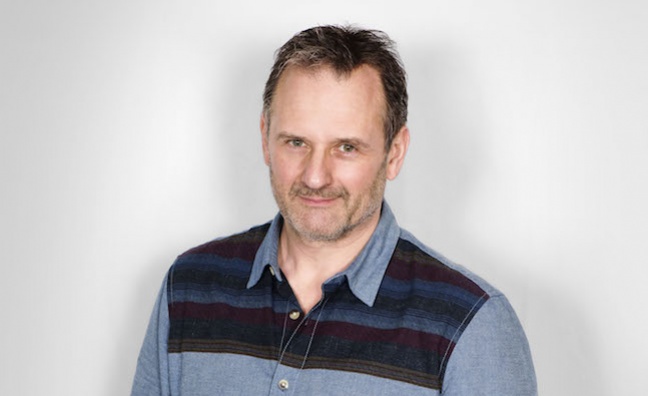The BBC Radio 2 Folk Awards takes place tonight (April 4) in Belfast – and you can listen along live on Radio 2 from 7.30pm. Highlights will be screened on BBC Four on April 8 at 9pm.
Radio 2’s Folk Show presenter Mark Radcliffe was the obvious host for the 19th edition of the ceremony (along with Scottish singer Julie Fowlis). Here, Radcliffe - also a BBC 6 Music presenter - talks Music Week through tonight’s ceremony…
Nick Drake is being entered into the Folk Awards Hall Of Fame – why’s it important to recognise his contribution?
There are people who have been significant figures in the story of folk music. It’s just a fascinating case Nick Drake, because the records are absolutely brilliant by Nick, they are absolutely world-class, amazing records which retain all their lustre and mystery. The really fascinating thing about Nick Drake is, of course, how he was so unsuccessful in his lifetime. The idea that a Nick Drake record would be a soundtrack to a global car commercial [for Volkswagen] is extraordinary really. The idea that somebody who could hardly bear to perform live or be seen in front of an audience would be this universally recognised figure with Brad Pitt doing documentaries [Radio 2’s Lost Boy – repeated after the ceremony] is just bizarre really.
Obviously, he’s a particular kind of folk singer, he’s a kind of a ballad singer really – he’s not a protest singer. A lot of folk music is about the voice of the working man and woman, the voice of struggle, the voice of protest, the voice of the oppressed, and Nick Drake’s not like that really. He’s the voice of the angst-ridden individual. But in these times where people are being encouraged to talk about mental health issues, I think that sort of introspection and examination of your own feelings has an extra poignancy these days. And the way he sings, it’s almost like a voice within your own head, it’s like eavesdropping on something. It will be amazing because his sister Gabrielle is going to be there to induct her brother, along with a guy called Cally Callomon, who’s very much the keeper of the Nick flame. And Olivia Chaney is going to sing River Man, so I think it will be quite a moment. Of course, we’re doing it in Belfast and I think there’s a lot of Irish flavour, but for that particular moment it could scarcely be more English.
Is there a strong Irish presence?
Absolutely. Dónal Lunny is going to get quite a big award [Lifetime Achievement], it’s hard to think of anyone that’s done more than him to take the music of Ireland and express it across the world in various different guises - he has been a real ambassador for that. Also, the Good Tradition Award is going to the Armagh Pipers club, so I think that will be quite a moment, when a group of young pipers from that esteemed organisation take to the stage. Then we’ve got one of the Young Folk Award finalists, Jack Warnock, he’s an Irishman. Lankum, who are very traditional – an unadorned sound - they’ll be making the trip from Dublin as well. So it will have plenty of Irish flavour.
Folk music is not this museum piece that’s stuck away in a glass case in the corner of the history of popular music
Mark Radcliffe
Do you think folk has done better than other genres of music when it comes to equal gender representation?
Yes, I would think so. Certainly when you look at people like Anne Briggs, Shirley Collins and Peggy Seeger, there are women who have had a very strong voice throughout the popularisation of folk music in the UK. I did look at this because I was aware of it, and of 36 nominees in all categories for the Folk Awards, I think 19 are female or acts with a female presence, so more than half. In folk music, I’m not aware of there being any divide, there are as many female singer-songwriters as male singer-songwriters.
We’ve seen country music grow in the UK in recent years – how’s folk doing?
The progress just continues apace really. It’s been going on for a few years, I don’t think there’s been anything seismic this year. But there’s gradually been an acceptance that folk music is part of the patchwork of music that’s important to young people in these islands and there are all kinds of people making interesting stuff. I think for a long time it’s been accepted that it is not the exclusive domain of people of a certain age who were around for the protest movements of the ‘60s in the back rooms of pubs. Now some of it is that, which is great, but there are all kinds of courses and conservatoires, particularly in Scotland, turning out young folk musicians of amazing dexterity and ability. I always think that’s fantastic, looking to find the next songwriter – who is it who’s going to put a voice to the way we live today?
Stations like 6 Music, where we play all kinds of different things have also helped. Folk music is not this museum piece that’s stuck away in a glass case in the corner of the history of popular music, it is a living, breathing thing that affects a lot of people. People do look to folk music to express the times we live in really. And the times we live in now are so extraordinary and so amazing, that I think its role is vital.









